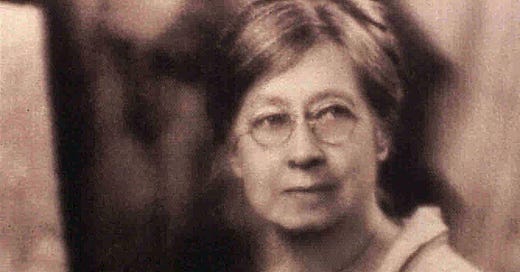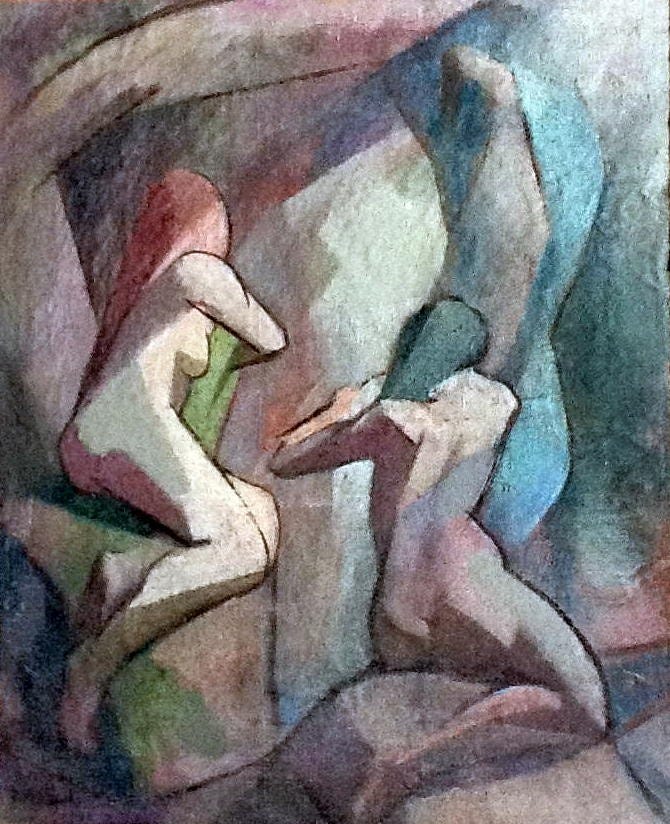Song of the Amorous Frogs – Part 11
A Story of Paris in the 1920s
(The Frogs return! Catch up on their earlier adventures here: Song of the Amorous Frogs.)
XXI
And so the days, weeks, months passed. In what seemed so short a time, we had arrived in the glorious summer of 1925 – glorious as all summers are glorious after grey winters and late springs.
I received word, through a friend of a friend of my mother, that my first art teacher in Houston, Mrs. Cherry (Emma Richardson Cherry), would be coming to Paris in the fall – was already in Brittany for the summer, touring and painting, with a friend, Clemmie Tan!
Hearing the name shocked me.
It had nothing to do with my Clem. I knew Mrs. Cherry’s “Clemmie Tan” to be a young woman, and from Denver and New York, not Chicago, and newly married to a husband who was off in Russia for academic research – knew it because of what my mother’s friend’s friend said. So nothing to do with my Clem at all. I was not superstitious, but such a convergence had to be more than coincidence. What more, I had no idea. But it must be more than “just one of those things” that happen.
I told my Cellist about Mrs. Cherry, and what a consummate painter and teacher she was, and wondered if he could take a few days away from his own teaching and playing for a journey to meet her (and her Clemmie), at Guérande, on the south coast of Brittany, where they would spend the summer.
He thought not; he had too much work to do to prepare both himself and his students for their examinations and concerts ahead; and, besides, he must “go to see my own people” for les vacances. But he said that I should go, of course, if I must see her before she came to Paris in the fall. He said it as though he thought there could hardly be any pressing need that might justify such a journey; but I “might as well go to Brittany as anywhere.” It disappointed me that he showed such little interest in meeting this woman of whom I thought so highly – but I had come to accept the little disappointments that so often must be brooked in order to partake of the great satisfactions of love for another, especially when that other is a being of splendid qualities in so many ways.
In the end I did not go off to Brittany. I could wait to see Mrs. Cherry until she came to Paris in the fall. And I could not stand the thought of going to Brittany – or anywhere – without my Cellist. Even though he would be away himself for a time, when he went to visit his people (of course, he did not suggest that I go there with him), I wanted to be in Paris with him for all the time he stayed there, and to be there to welcome him back, the moment he returned.
In mid-September, I had a note from Mrs. Cherry to tell me that she and her Clemmie had arrived in Paris, and taken rooms together not far from me, at the Hotel Dagmar, in rue St. Jacques, near the Luxembourg Gardens. I went immediately to see her.
It had been some years since our last meeting, in Houston, and I had changed immensely (so I thought), both my person and my life, but she seemed to have changed hardly at all. She was a small woman in physical presence – her loved ones at home called her “Little One” – but a woman with a compelling, and appealing, personality, and with a vast talent as a painter – a painter of the old school, even by her own admission, who had learned to paint “academic, pretty things” when she was young, in New York, at the Art Students League, instructed by such American masters as William Merritt Chase and Walter Shirlaw, and in Paris at Académie Julian. She had learned to paint Impressionist paintings then, and had painted in Giverny in the 1880s – perhaps the first woman to paint there, certainly the first American woman to do so. But, though now already in her 60s and fully formed in her art, she wanted always to be “Modern,” in all things – especially art – and she had come to Paris, which she loved and had visited many times, this time to learn Cubism from my own teacher, Andre Lhote.
As I walked into the small lobby of her hotel at the time she had appointed, after her morning in Lhote’s studio, and after some time for gallery going – to see the newest Paris paintings; she took the time for seeing paintings every day – I heard her captivating laugh coming from the sitting room beyond. For many, me among them, her laugh was the thing that defined her most (always after her paintings, of course, which were the essence of her, and the substance of her life). A laugh that compelled one to like her, love her almost, from first hearing, even before an actual introduction, and that stayed in the memory above all else (her paintings excepted, of course) for as long as one would remember her, or anything at all.
“How nice it is to be back in Paris,” she said as we settled into our arm chairs for our comforting renewal of friendship. Though the difference in our ages might be vast, her easy cordiality made us old friends, not mentor and acolyte, and put me at ease in a moment. I managed my part of the conversation, but it was she who gave the fascination and sparkle to it.
“Seizing the crumbs that fall from the Parisian table. Walking these old familiar streets, looking in all the shop windows, seeing all the old buildings, the churches – though I am far from religious, except in appreciation of the ancient beauty of the spirits that built them, and filled them with art – makes returning, after so long, a joy.
“So much of interest that the days are full. So much to see, so much to hear, so much to do, so much to think about, crowding the days beyond capacity. I thought I appreciated Paris on my other visits, but never has it seemed so interesting and full of charm as this time. I hardly can believe that I have not been here since 1912. And yet, I feel already as though I have been here always.
“And now, pretending to be a young art student again, joining a private class in Lhote’s studio. He takes life lightly but art seriously, as I know you know. A splendid artist and a splendid teacher.”
She went on with such joie de vivre that no one could have resisted her pull – though I could not imagine that anyone would have wanted to.
“Clemmie Tan sends regrets that she cannot be here to meet you today. She has her own classes – today in French – she teaches French to girls in New York. Though she hopes to spend most of her time in Paris studying art, at Parsons. She’s an excellent artist already, and plans to teach art instead of French when she goes home.”
I mentioned to her what a shock I’d had when I heard her traveling companion’s name, and told her about my Clem – how he had gone away some time ago, so I had not seen him in such a long time – and how sad I’d been when he departed. From the way she looked at me I knew that she saw so much more than my words would seem to reveal.
So I continued, telling her how I now had a new friend, my Cellist, and, after a time of pain, had found a new reason to be in Paris. I told it all in such a way that she understood, but not so explicitly as to risk causing uneasiness for even a sympathetic friend – as I hoped she would be. Because some things were not to be spoken, even in this modern day, even with the most sympathetic listeners.
“Of the Oscar Wilde sort?” she asked, with caring in her tone. It was a phrase that conveyed deep truths – and suggested deep wounds – and could be spoken and understood across generations.
“Yes,” I said.
She put her hand on mine, as it rested on the chair arm, and she said nothing for a few moments, which said more, and gave more comfort, than any words she could have spoken.
“Such endings are painful, certainly, but there is someone now, which is what is important,” and with that, she brought us both back from a place of darkness, into the renewing Paris light.
“You will like Clemmie as much as I do when you meet her,” she said, taking a different turn, perhaps because she felt that we had taken the line of our earlier conversation as far as it could delicately go.
“She is a strong and loving person. Her husband, a brilliant young scholar, is off teaching the Russians how to run their country.” She laughed that beguiling laugh. “Not really, though he hopes to learn so much about how they do run it, and to help our two countries understand each other better.”
She continued, “He encourages her to find her calling – as all husbands should, but so few do. He even took her name as his, so they are now both ‘Tanqueray Robinson.’” She paused for a moment to let the power of that fact sink in.
“I have also been lucky in that way with my Brook – Mr. Cherry. He has not always understood my need for art, but he has never hindered me as I pursued it. We understood from the beginning that I would not be a conventional wife, nor ours a conventional marriage. That has been true, and I helped him understand and accept it. It has been a long, good marriage, of respect as well as love. And, of course, of compromise. All marriages of equals must be that too. So many men seem not to understand compromise in marriage. It must be different when you are two men together, even if it cannot be deemed a marriage in the eyes of the world.”
I wondered if I could really agree that it was different. Perhaps, in truth, doubly challenging, with two male egos and no models to emulate in a world made mostly of man-woman marriages. That might be part of the thrill of life in the Paris I had found – the sense of finding new models for men, and women, who were not conventional, as the world defined it – for the Barbettes that hid inside us, who could only emerge in a place so nearly unreal as Paris.
“Your mother has asked me for news about your Paris life. What shall I tell her? Shall I say, simply, that you thrive? I think that will be enough – and true, I trust.”
I said it was true.
“Then that’s all I shall say. It’s what mothers long to hear – and all we need to hear,” and she laughed her sparkling laugh again.
I knew I had a friend that I could trust in Mrs. Cherry.






What fun!